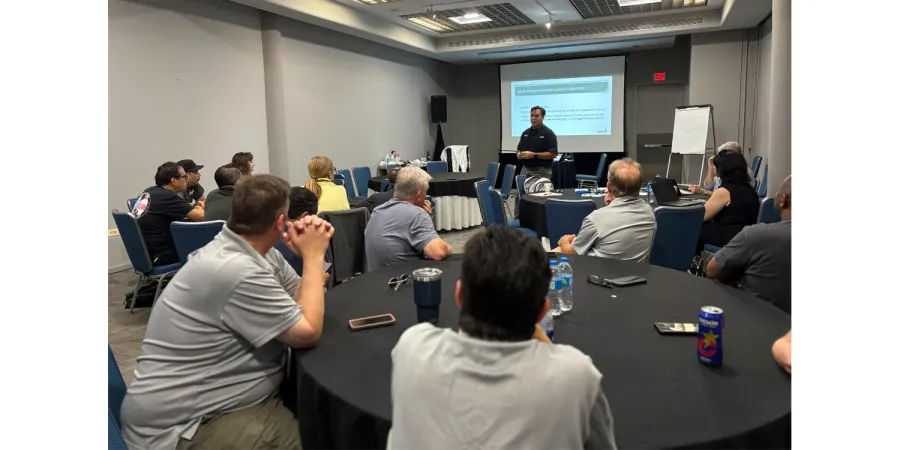USW SERTs visit Puerto Rico

Fourteen Specialized Emergency Response Trainers (SERTs), along with five Tony Mazzocchi Center (TMC) staff members, gathered in Ponce, Puerto Rico, on June 3-7.
The purpose of the week-long visit was to engage existing partner community organizations for future cooperation around disaster preparedness as well as to expose the team to incident command center protocols.
The five-day visit was brilliantly organized by United Steelworkers (USW) District 4 Local Union 8198 Worker-Trainer and SERT Mayra Rivera. An expert hurricane preparation and response activist since 2017 when Hurricane Maria struck causing untold damage to the island and over 3,000 deaths, Rivera has since built a reliable network of trainers throughout Puerto Rico. And although Rivera had arranged for each day to have a specific educational agenda to complete, the SERTs’ days were filled with many surprises, including a torrential rain on the first day that caused an actual flood. Real-world events like these were enhanced by rich encounters the SERTs had with local activists.
Throughout the week, the SERTs met with no less than four community organizations. Among the places visited were the neighborhoods Real and Anón high in the mountains where citizens are especially vulnerable to floods and fires. Another was the Clausells Centro Comunitario, which is nestled in a hilly neighborhood near downtown Ponce. A day-long disaster preparedness fair was held at the center where the SERTs actively participated in discussions as well as distributing training materials.
Given the SERTs’ growing experience in connecting with leadership-level representatives from organizations from their previous visits to Pasadena, New Orleans, and the U.S. Virgin Islands, they were well prepared to discuss methods of creating pathways for future communication.
Among the key issues that the SERTs regularly address is industrially caused environmental disasters. And on a scorching hot day, the SERTs went to get a firsthand look at CORCO (Commonwealth Oil Refining Company), a decommissioned oil refinery, which is in a valley about seven miles southeast of Ponce, settled between the towns of Peñuelas and Guayanilla. Since its demise in 1982, the plant is now mainly a wonderland of rusty steel. The closing of the plant not only brought about devastating economic consequences to the area, but also, environmental degradation.
The SERTs visited the surrounding bayside villages that have regularly suffered from flooding due to hurricanes and spillage of industrial toxins into the soil. It’s not uncommon for health hazards produced by natural events to worsen because of poor industrial hygiene. Witnessing conditions like these at close range always makes a deep impression on the trainers, something they discuss in their follow-up meetings after each visit. These exchanges of experiences and ideas are crucial to building the program because each individual SERT, in concert with all the others, is expected to contribute to the continual revisions of the Disaster Preparedness training manuals.
The SERTs often laser focus on specific hazards related to disasters. And for this visit to Puerto Rico, the topic studied was mold, specifically mold remediation. Given that the population on the island frequently encounters and gets sick from mold, the topic was very much on point.
The SERTs attended a three-hour workshop put on by local mold remediation experts, fellow grantees from Sustainable Workplace Alliance (SWA), David Casavant and Israel Rosa. The session was very much a hands-on affair, tackling the exact steps to rid walls, floors and roofs of mold.
Incident Command Centers are an essential part of any municipality’s disaster preparedness and response capabilities, and the city of Ponce’s is certainly no exception.
The SERTs were grateful to be invited to meet with directors and staff of the Ponce central station, which has a comprehensive system to deal with all kinds of emergencies, not the least of which is hurricanes.

The fire, ambulance and other specialized forces, shared their lessons learned with the SERTs. The talks were frank and to the point, highlighting which parts of the emergency system were still being improved and why.
The center monitors the minutest weather changes in the Caribbean Sea on the lookout for tropical storms, as well as seismic activity. The Ponce municipality regularly experiences small to medium earthquakes. Flooding is also common in the area.
Wednesday evening was arguably the highlight of the trip. Ponce City officials quite literally rolled out the red carpet for the SERTs, making available some of their highest office holders to talk about how hurricane damage unfolds and how the government coordinates responses. This encuentro (“meeting of the minds”) was all due to the formidable leadership qualities of USW Local 8198, spearheaded by Rivera. The discussion that ensued, as with all of discussions during the week, was conducted in Spanish. And thanks to USW Local 4-318 board member and lead SERTs trainer Arturo Archila’s skillful live translations, everyone stayed tightly in the loop of what was being discussed.
The SERTs visit to Puerto Rico was—to put it mildly, a huge success. The trainers were able to substantially amplify their arsenal of disaster preparedness knowledge. Also, an incredibly high level of synergy between the trainers and their gracious guests was maintained throughout week. The lessons learned from this trip will be directly applied to whatever USW Districts the SERTs visit in the coming year, and at the USW Health, Safety and Environment Conference, Aug. 19-23 in Pittsburgh, Pa.
For more pictures, visit the TMC Flickr.